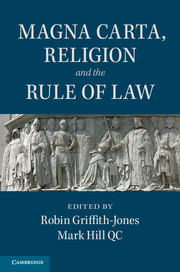Book contents
- Frontmatter
- Contents
- List of contributors
- Preface and acknowledgments
- I Introduction
- II The birth of Magna Carta and the spread of its principles
- 3 Due process in Magna Carta: its sources in English law, canon law and Stephen Langton
- 4 From Charter to common law: the rights and liberties of the pre-Reformation Church
- 5 Magna Carta and the law of nations
- 6 Magna Carta and personal liberty
- 7 Towards a new Magna Carta for early modern England
- 8 Differences over the foundation of law in seventeenth- and eighteenth-century America
- III Comparative religious approaches to Magna Carta's rule of law
- IV The contemporary inheritance of Magna Carta
- Appendix The Charters in translation
- Bibliography
- Index
7 - Towards a new Magna Carta for early modern England
from II - The birth of Magna Carta and the spread of its principles
Published online by Cambridge University Press: 05 May 2015
- Frontmatter
- Contents
- List of contributors
- Preface and acknowledgments
- I Introduction
- II The birth of Magna Carta and the spread of its principles
- 3 Due process in Magna Carta: its sources in English law, canon law and Stephen Langton
- 4 From Charter to common law: the rights and liberties of the pre-Reformation Church
- 5 Magna Carta and the law of nations
- 6 Magna Carta and personal liberty
- 7 Towards a new Magna Carta for early modern England
- 8 Differences over the foundation of law in seventeenth- and eighteenth-century America
- III Comparative religious approaches to Magna Carta's rule of law
- IV The contemporary inheritance of Magna Carta
- Appendix The Charters in translation
- Bibliography
- Index
Summary
Introduction
In his splendid chapter in this volume, Professor Sir John Baker QC shows that the Magna Carta of 1215/25 was a critical early source of common-law rights and liberties that later Parliaments, courts and jurists slowly made ever more real and inclusive. In his equally splendid chapter herein, Professor R H Helmholz shows that charters and other formal declarations of rights and liberties were quite common in the medieval ius commune of the Continent, too, and they may well have influenced the development of rights in the medieval common law, if not in the Magna Carta itself.
Both of these eminent legal historians are part of a growing cadre of scholars who have shown that the Middle Ages were a fertile seedbed for the growth of rights and liberties in the Western legal tradition. The Magna Carta and its immediate medieval progeny made ample provision for early forms of jury trial, fair taxation, various criminal procedural protections, rights of marriage, private property and inheritance, freedom of trade, travel and commerce, freedom of the Church, and more. Particularly prescient for later Western constitutionalism were Articles 39 and 40 of the 1215 Magna Carta (Article 29 in the better-known 1225 version): ‘No free man shall be taken, imprisoned, disseised, outlawed, banished, or in any way destroyed, nor will We proceed against or prosecute him, except by the lawful judgment of his peers and by the law of the land.’ ‘To no one will We sell, to none will We deny or delay, right or justice.’ To be sure, Magna Carta and other medieval charters were not comprehensive modern statements of rights and liberties. Particularly the fundamental freedoms of religion, speech, press and association, Professor Baker shows, though taken for granted today, were only narrowly drawn even in the most progressive of medieval legal texts. And many other commonplace rights today, particularly those set out in the 1966 International Covenants on Civil and Political Rights and on Economic, Social and Cultural Rights were hardly prefigured at all in the Middle Ages.
- Type
- Chapter
- Information
- Magna Carta, Religion and the Rule of Law , pp. 109 - 135Publisher: Cambridge University PressPrint publication year: 2015



